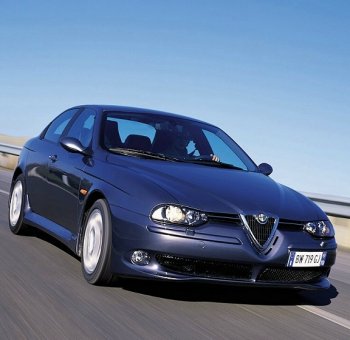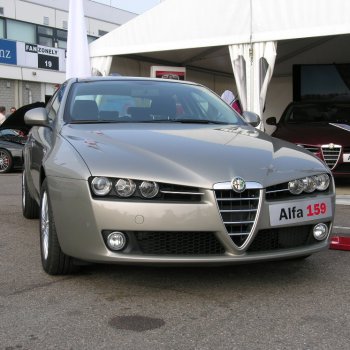|
The Alfa Romeo
159 - sure to be one of the overall favourites - and Fiat Croma are amongst the 28 new cars that will be
fighting it out for the title of 'European Car of the year
2005' over the next two months, although the new Fiat Grande
Punto just misses out.
All of the contenders - who are seeking to wrest the crown
away from last
year's winner, Toyota's innovative Prius hybrid - are new
cars which have to be available in five or more European
markets, currently or within a few weeks, and each has to
have the prospect of at least 5,000 yearly sales. The voting
process has two stages. The first one will produce a short
list of seven nominees, which will be announced in early
October, while the second round will find the single winner,
which will be made known on November 14th.
The stylish new
executive Alfa Romeo 159 is targeting nothing short of
outright victory, although the competition will be fierce
this year. Early favourites include the new Toyota Yaris,
Renault Clio, Suzuki Swift, Citroen C1/Peugeot 107/Toyota
Ayego family, BMW 3-series and Mercedes B-class. The new
Alfa 159 - which has gone on sale in the major European
countries' this month - will be aiming to emulate its
predecessor, the Alfa 156, which itself is a former winner
of the highly prestigious award, taking the title in 1998.
Fiat Auto have a strong record in the
contest, with Fiat, Alfa Romeo and Lancia combined having
racked up more wins that any other carmaker. With the new
Grande Punto just missing out on an entry (it arrives on the
market too late this year to be included) honour rests with the new Fiat Croma - which went on sale during the early summer - and
will be looking to uphold this winning this tradition. A
cleverly-built multi-purpose 'stationwagon' - designed by
Giorgetto Giugiaro - it will be aiming to follow in the
footsteps of Fiat's most recent winner - the Panda, in 2004
(the first ever victor to be picked from A-segment) - and
add its name to the roll of honour.
An expert,
independent judgement of all new cars on the European market
The Car of the
Year is an international award, judged by a panel of senior
motoring journalists across Europe. Its object is to acclaim
the most outstanding new car to go on sale in the 12 months
preceding the date of the title.
What is recognized worldwide as the Car of the Year award,
came about to avoid confusion among ‘top car’ comparisons
run by magazines and newspapers in various countries. In
1963, Fred van der Vlugt, then editor of the Dutch motoring
magazine Auto Visie, reasoned that combining resources would
produce a more credible result that would attract wider
publicity.
Van der Vlugt approached 26 professional car testers, from
nine different countries, to form an expert Car of the Year
jury. The formula remains the same today, nearly 40 years
on, but now involves 58 Jury members representing 22
countries.
The Car of the Year is a non-profit institution, independent
of the motor industry. Members receive no payment for
serving on the Jury. The expenses of organising the contest
are met by seven publications which promote the award and
host the prizegiving by rotation.
The Car of the Year trophy is presented to the winning car
manufacturer in January. The manufacturer is entitled to use
the title and the distinctive Car of the Year logo for the
year of the award.
|
 |
|
The new Alfa 159 - which has gone on sale in the
major European countries' this month - will be
aiming to emulate its predecessor, the Alfa 156
(above) which itself is a former winner of the
prestigious award, having won the title in 1998 |
|
|
 |
|
The Alfa Romeo 159 (above) and Fiat Croma are
amongst the 28 new cars that will be fighting it out
for the title of 'European Car of the year 2005'
over the coming two months |
|
|
What makes a 'Car of the Year'
The object of
Car of the Year is to find a single, decisive winner. The
voting process is designed for that purpose, and not to
provide a scale of merit of all competing cars. There are no
categories, sub-divisions or class winners. Obviously this
requires the Jury to assess cars of very different types and
price, which means assessing them against their market
rivals. The 58 members
of the Car of the Year Jury all test cars as part of their
journalistic work. In selecting the car of the year they use
the following criteria: design, comfort, safety, economy,
handling, performance, functionality, environmental
requirements, driver satisfaction, and price. Technical
innovation and value for money are particularly important
factors. In September,
the Jury Committee draws up a list of eligible cars from all
the newcomers presented over the previous 12 months.
Eligible cars must be essentially new models, not simply
changed cosmetically or by the installation of new engine or
a transmission. They are considered irrespective of their
country of origin but must be available in at least five
European countries at the time of voting and have an
expected sales volume of 5,000 a year. The Jury then
elects a short list of seven cars in a simple vote. For the
second stage, each Jury member has 25 points to apportion to
at least five cars, with a maximum of 10 points for any one
of them, and produces a statement of justification for the
vote, which is published at the time of the award
presentation.
A truly international award
The Car of the Year Organizing
Committee is made up of managers from the seven prominent
publications around Europe which take it in turn to organize
the vote, publicize and promote the contest, and hold the
prizegiving ceremony. The Jury is completely independent of
the Organizing Committee in matters pertaining to the award
itself - the selection of eligible cars and the voting.
The seven organizers of car of the Year are:
Auto (Italy) ,
Autocar (UK),
Autopista (Spain),
Autovisie (Holland),
L'Automobile Magazine (France),
Stern (Germany) and
Vi Bilägare (Sweden).
The Jury for the
Car of the Year 2005 consists of 58 members, representing 22
European countries. National representation on the Jury is
related to the size of the country's car market and its
importance in car manufacturing. France, Germany, Great
Britain, Italy and Spain each have six members; other
countries, proportionally fewer. Members of the
Jury are elected for their personal competence, and not
because of the importance of the publications they may
represent. New members join the Jury at the invitation of
the Jury Committee, following recommendations from regional
groups. Each year, every member is required to confirm that
car testing is a major part of his or her professional
activity. The Jury
Committee consists of the members that represent the
Organising publications plus three officers elected
annually. For 2006 there
are, as President: Ray Hutton, motoring correspondent of The
Sunday Times, UK, Vice-president: Sergio Piccione, Autovía/Autopista,
Spain, and as Secretary-General: Eduardo Azpilicueta, Motorpress
Ibérica, Spain.
|
|
|
|
![]()
![]()